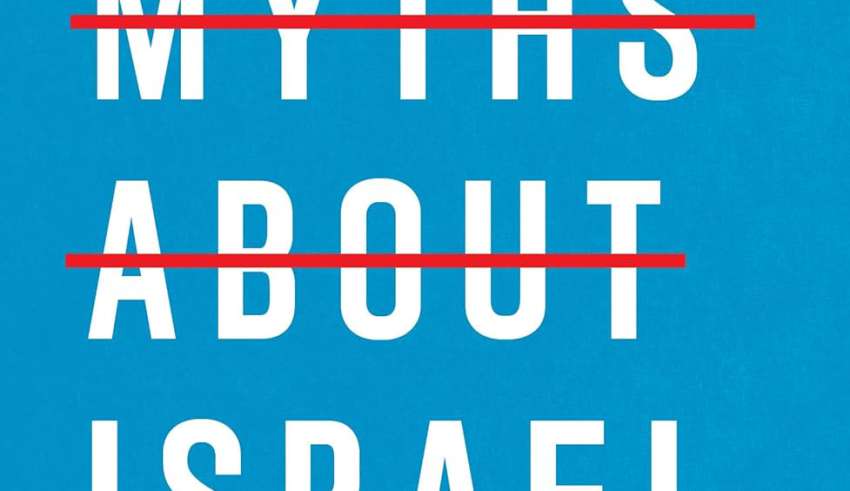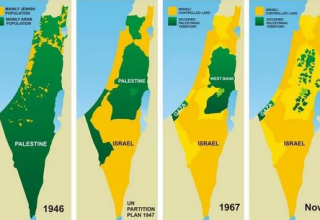(Verso, London and New York, 2017)
Book review by Wallace McKitrick
How did Zionism begin, in its Christian and Jewish forms? What distinguishes secular Jewish Zionism from religious Zionism? Were Palestinians forcibly ejected from their homelands and economy by Jewish settlers in the C20th century? Have Palestinian representatives repeatedly sabotaged potential peace agreements, as alleged by successive Israeli and US governments? Is a ‘two-state’ resolution possible? Given the historical ingredients, what seem likely or inevitable consequences?
In 190 pages, Ilan Pappe succinctly treats these questions in a scholarly, humane way. The book is as relevant now as when it was first published seven years ago. Events of the last year in Palestine and region are a glaring and horrible demonstration of the accuracy of Pappe’s predictions. His analysis is of particular interest because it has grown not from an inherited political commitment, but from decades of painstaking research that dispelled the falsehoods and blindness inculcated in him as he grew up.
Biographical note: Ilan Pappe
Pappe was born a Jewish Israeli citizen in 1954 and schooled in Israel. He gained a Batchelor of Arts degree at the Hebrew University in Jerusalem, then a Doctor of Philosophy at University of Oxford, England, in 1984. His first university teaching positions were in the departments of History and Political Science at Haifa University, Israel, 1984-2006. He founded and directed the Academic Institute for Peace in Givat Haviva, Israel, 1992-2000 and was the Chair of the Emil Tuma Institute for Palestine Studies in Haifa between 2000 and 2006.
Moving to Exeter University, England, in 2007 he was appointed chair of the History department. He remains at Exeter, now as Professor of History and Director of the European Centre for Palestine Studies. His research focuses on the modern Middle East and in particular the history of Israel and Palestine. (Source: https://sociology.exeter.ac.uk/staff/pappe )
In the preface to Ten Myths about Israel we learn that as a young historian in Israel committed to honest inquiry, Pappe began to notice discrepancies between Israeli government accounts of the past and the accounts of participants – Palestinians and Israeli Jews – in actions that had displaced or killed Palestinians whose families have lived there for at least several hundreds of years. Some other young Israeli historians also began to explore the silences and distortions in the official Israeli version of the past.
Only when Pappe went to Britain for postgraduate study did he discover a wealth of documents, some at that time only newly declassified in Britain and the US, which decisively overturned the Israeli establishment’s myths. Over following decades, Pappe has courageously continued this truth-telling. Clear about the settler-colonial nature of the Israeli state, he asserts the rights and interests of the Palestinian people.
In doing so, he argues convincingly that the wellbeing of Jewish people in the region will be best served by abandonment of the Zionist colonial project, restoration of land stolen from Palestinian communities, and arrangements which guarantee the human and economic rights of Palestinians.
Two sites with current material from Pappe are worth looking at from time to time: https://www.middleeasteye.net/users/ilan-pappe and https://www.palestinechronicle.com/my-israeli-friends-this-is-why-i-support-palestinians-ilan-pappe/
What are the myths demolished by Pappe?
The ten myths he dissects and disproves are:
FALLACIES OF THE PAST
1. Palestine was an empty land
2. The Jews were a people without a land
3. Zionism is Judaism
4. Zionism is not colonialism
5. The Palestinians voluntarily left their homeland in 1948
6. The June 1967 war was a war of ‘no choice’ [for Israel]
FALLACIES OF THE PRESENT
7. Israel is the only democracy in the Middle East
8. The Oslo mythologies [Pappe disposes of numerous Zionist and US government falsehoods about the substance and processes involved in the so-called 1993 Oslo Accord.]
9. The Gaza mythologies [Pappe dissects falsehoods about the 2005 Hamas movement, Israel’s withdrawal of occupation troops from Gaza, and Israel’s ‘self-defence against terrorism’ justification of its accelerated genocide of the people of Gaza]
LOOKING AHEAD
10. The Two-States solution is the only way forward
His concluding section is titled ‘The Settler-Colonial State of Israel in the twenty-first century’. It explores several possible future scenarios, positive and negative.
The continuing urgent relevance of Pappe’s analysis
This review/revisit of his book won’t attempt to convey Pappe’s extensive findings. The book is easily read, concise and diligently supported by end-notes. Below we simply note that events in Palestine since publication of Pappe’s book bear out the accuracy of his 2017 assessment of likely outcomes in the region.
Israel’s behaviour in Gaza, the West Bank, Lebanon and Iran in the last year can be seen not as a new phase of ‘self-defence’, but as an all-out furthering of the settler-colonial project to the point where the Israeli state has virtually eliminated the Palestinian population, and a ‘Palestinian state’ alongside Israel is geographically and politically impossible (as it always has been, given Zionist objectives).
Only thorough, honest recasting of the issues will allow both freedom for Palestinian in their homelands and a lasting peace among the peoples of the region.








